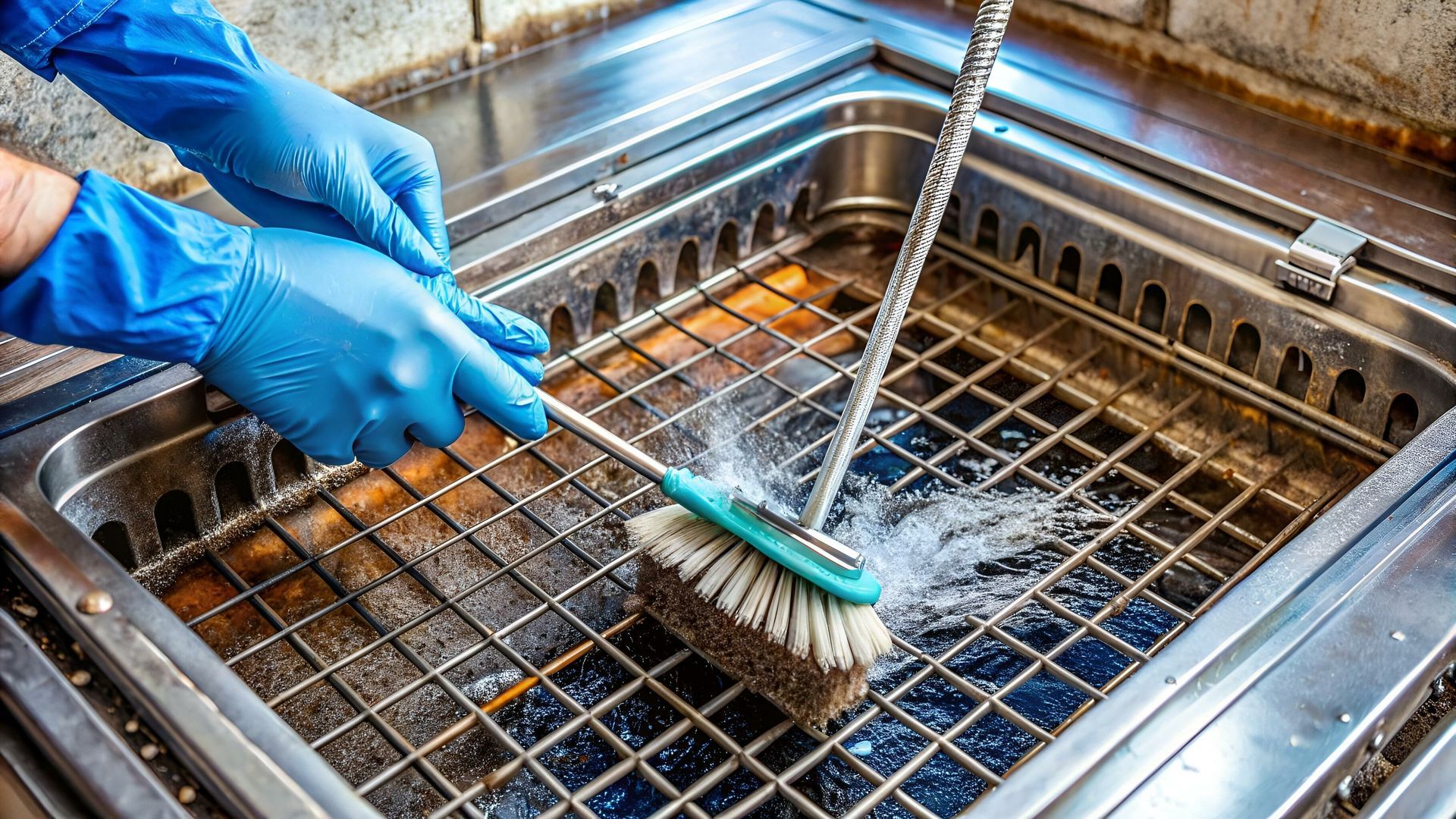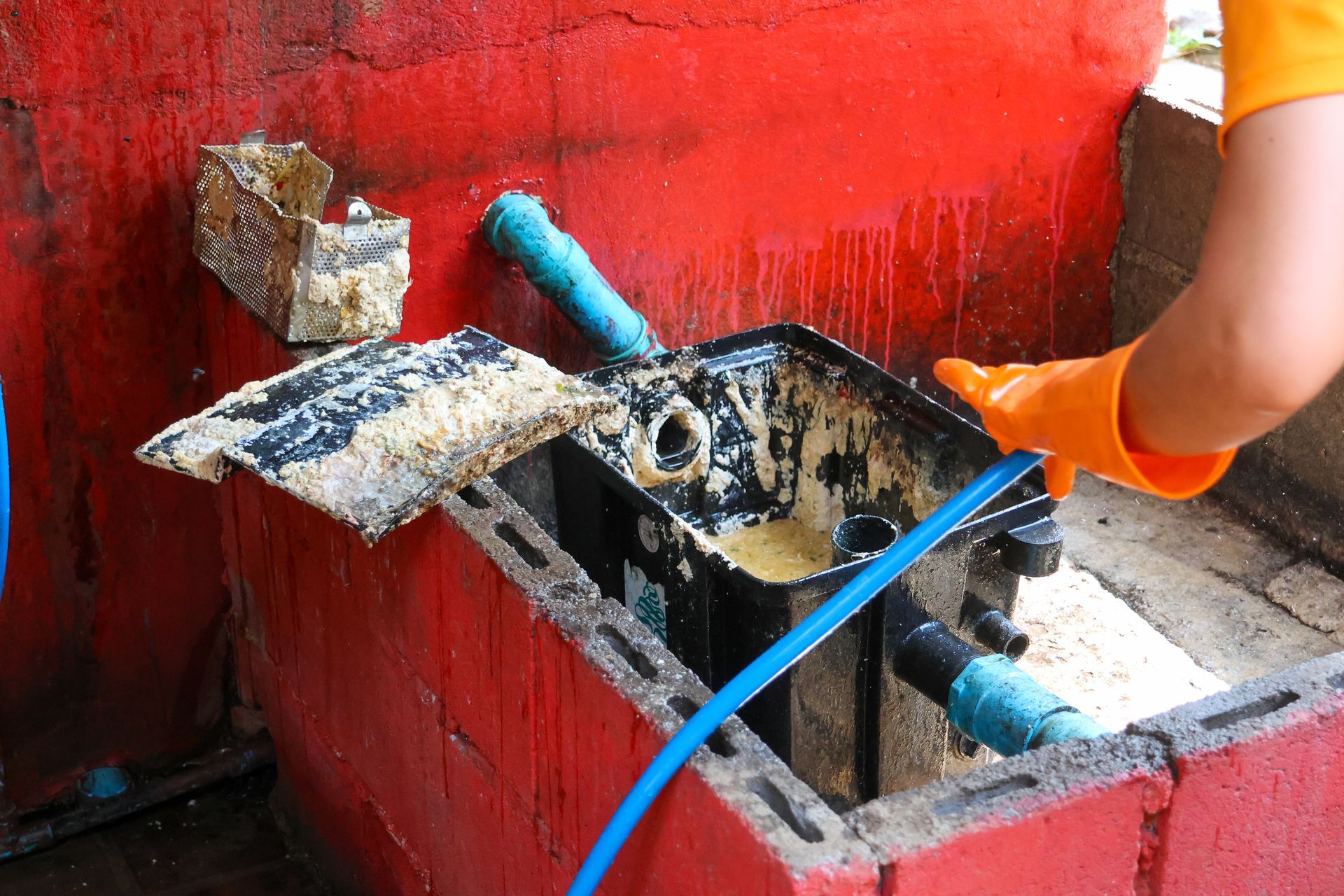Why DIY Power-Washing Isn’t a Grease Trap Cleaning Solution

If you operate a commercial kitchen, you already know how vital your grease trap is. It’s the unsung hero preventing fats, oils and grease (FOG) from clogging your sewer line and causing catastrophic backups.
Most food service business owners understand the importance of grease trap maintenance, but that doesn’t mean they like the added operating expense. Some may be tempted to go the DIY route by using additives, enzymes or attempting their own cleaning.
There are a few problems with attempting to tackle grease trap cleaning on your own.
- DIY cleaning violates local ordinances, which require a licensed provider to both clean the grease traps and remove the FOG and wastewater for processing and disposal
- Grease traps can be damaged by improper cleaning
- Some of the seemingly ‘low cost’ alternatives don’t actually work, especially if they don’t involve removing the FOG from the trap
The Appeal of Power-Washing: A Dangerous Shortcut
It’s easy to see why some might consider power-washing their grease trap. It’s fast, seemingly efficient, and gives the illusion of a thorough clean. DIY enthusiasts or maintenance teams unfamiliar with the intricacies of grease traps may view power-washing as a cost-saving alternative to professional service.
But the reality is this: grease traps are not like sidewalks or driveways. They are intricate systems with specific design functions, and using high-pressure water on them can cause serious, often irreversible damage.
Cleaning the walls of the trap isn’t the primary goal. Power washing doesn’t actually remove the FOG that has collected in the trap between cleanings.
Risk #1: Structural Damage to the Grease Trap
Grease traps are typically made from metal or plastic and consist of multiple compartments, baffles, and seals.
High-pressure power washers can:
- Dislodge or break internal components, which disrupts the function of the trap.
- Compromise seals that keep wastewater and FOG separated.
- Weaken or crack plastic units, especially if the trap is older or made from lightweight material.
These types of structural damage can turn a minor cleaning task into a major (and expensive) repair job.
Risk #2: Pushing Grease Into the Sewer Line
One of the biggest dangers of using a power washer is that it redistributes the grease rather than removing it.
When high-pressure water hits built-up FOG in the trap, it can blast the grease straight into the outlet pipe and onward into your sewer line.
This completely defeats the purpose of the grease trap and introduces several new problems:
- Clogged pipes that can lead to backups in your kitchen.
- Sewer line blockages, which can affect not only your business but also neighboring properties.
- Fines or citations from local wastewater authorities for violating FOG discharge regulations.
What seemed like a quick fix suddenly becomes a plumbing emergency, with regulatory and financial consequences.
Risk #3: Incomplete Cleaning and Biohazard Exposure
If proper PPE and safety protocols aren’t followed, those cleaning the trap risk exposure to:
- Harmful bacteria and pathogens
- Hazardous gases like hydrogen sulfide
- Contaminated water and sludge
Professionals are trained and licensed to handle these conditions safely and thoroughly. DIY efforts often lack this level of precision and protection.
Why Professional Grease Trap Cleaning Is Essential
Licensed professionals, like those at Southern Green Industries, use industry-specific tools, vacuum trucks, proper techniques, and proven waste disposal methods that ensure:
- Complete removal of FOG and food solids
- Inspection of components for wear and tear
- Proper disposal of grease in accordance with local and state regulations
- Accurate recordkeeping for health department compliance
Most importantly, professional cleaning helps you maintain system integrity, avoid expensive plumbing issues and keep your kitchen running smoothly.
The Southern Green Difference
At Southern Green Industries, we specialize in grease trap maintenance and used fryer oil recycling in the Atlanta area. Our experienced technicians use vacuum-based FOG removal and advanced cleaning techniques to make sure your grease trap is thoroughly cleaned without damaging any components.
We go beyond cleaning by providing:
- Preventive maintenance programs tailored to your kitchen’s needs
- Emergency service for unexpected blockages or backups
- Documentation and reporting for regulatory compliance
- Eco-friendly practices that keep your business and the environment safe
Don’t Risk the Consequences of Ineffective DIY Grease Trap Cleaning
Power-washing might seem like a convenient shortcut, but when it comes to grease trap maintenance, it’s a risk you can’t afford to take. Structural damage, sewer line clogs and regulatory violations are just a few of the consequences of DIY or over-aggressive cleaning.
Call us today at (404) 419-6887 to request a free quote or to book one-off cleaning.
Recent Blog Posts
Contact us Today for a FREE Quote
We are committed to making grease trap cleaning and fryer oil recycling as clean and easy as possible. If you’d like to learn more about our services or get a quote, give us a call at (404) 419-6887.



